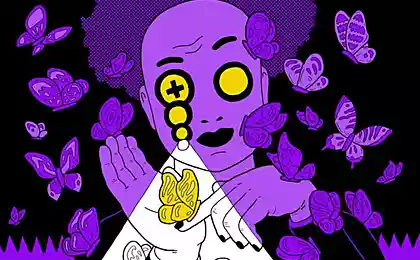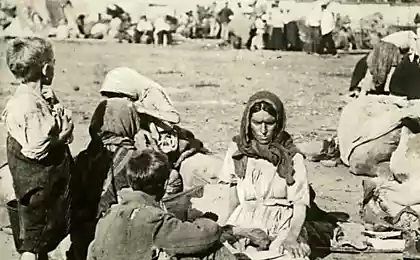501
Woe from wit: thesis famous writers
Ninety four million four hundred eighty seven thousand fifty four
© A Friend of Mine.
It is believed, though the most valuable school for a writer is the school of life. However, contrary to stereotypes, many writers get an academic education, going to universities and purposefully build a scientific career.
Robert Musil "To the evaluation of the teachings of Maha»
Seventy three million eight hundred sixty two thousand nine hundred five
Before you take on his main novel "Man without qualities", Robert Musil worked in the scientific field and the highest of hopes. In 1901 he graduated from the Technical University of Brno with a degree "engineer", later moved to Berlin, where he began to study psychology and philosophy and became interested in the ideas of Friedrich Nietzsche and Ernst Mach. The latter was the subject of the dissertation, the Musil, which he wrote under the guidance of Carl Stumpf, a famous German psychologist, whose work is traditionally considered the first swallows of phenomenology and of Gestalt. Labor Musil impressed the academic community, and he shortly proposed to be habilitacao — analog of the award of the degree of doctor of science in Russia. However, the young scientist had already managed to publish the novel "the Emotional turmoil of the pupil of Teresa" and decided to devote himself to literature; in science he never came back.
Jonathan CoE "Satire and sympathy as properties edifying narrative in "Tom Jones" and other comic novels»
Thirty seven million six hundred six thousand seven hundred ninety three
Jonathan CoE is a graduate of the prestigious Trinity College of Cambridge University, but his academic career is connected with Warwick University, where the writer in the mid-1980s, he taught English poetry and received the degree of doctor of philosophy for a thesis on the work of Henry Fielding. The work of the CoE is an attempt to understand the role of the narrator in the books of the founder of the genre of the English realistic novel, and to prove that the ambivalence of laughter in "the History of Tom Jones, a foundling" is achieved through the figure of the author-demiurge, with its perpetual readiness to assess the actions of the characters, while remaining above them. Speaking about the impact of Fielding on the next generation of writers, kou turns to the poetics of the works are not only evident in the case of Dickens, Beckett and Brecht, but also of Flaubert — an approach to literary studies is not the most traditional. Yes, and the CoE learned a lot from the books of his literary idol: his heroes — those brave klutz, in which the natural purity fights the harmful influence of the environment.
Stefan Zweig "The Philosophy Of Hippolyte Tan»
Twelve million five hundred sixty four thousand nine hundred sixty two
Stefan Zweig, a favorite of women and Maxim Gorky, came from a wealthy Jewish family and was educated at the University of Vienna. Zweig studied philosophy and in 1904 was awarded a doctorate for his thesis on the doctrine of Hippolytus Tena — representative of the French school of positivism. An important place in the philosophical system of Ten took the problem of the relation of art and objective reality: it is claimed that any work, no matter what genre or direction it may belong and whatever bizarre may assume, is not a figment of the imagination of the author, and the cast of the reality surrounding him. However, the interest Zweig to the shape of PETN can be explained not only by the fact that the latter developed the art and literary methodology: Ten, among other things, was a historian and wrote the monumental work "the Origin of modern France". Zweig, on the other hand, has created a series of fictionalized biographies of iconic historical characters — Mary Stuart, Erasmus, Magellan, etc.
Mario Vargas Llosa “garcía márquez: the language and narrative structure”
Ninety eight million sixty five thousand one hundred sixty one
The fact that Vargas Llosa has defended the dissertation on the works of Garcia Marquez, it seems rather comical, considering the history of relations between two classics of Latin American magic realism. Comical and sad. For a long time, the Nobel laureates were best friends, lived down the street in Barcelona, and even planned to write together a novel about the Colombian-Peruvian war of the 1930-ies. Events unfolded rapidly: in the early 1970s, Vargas Llosa defended the same thesis, and in the middle of the punched garcía márquez savory slap in the front of journalists. It is still unclear, from-for what quarrel writers — whether because of the women, whether because of the fundamentally different views on the policy of Fidel Castro. To establish a relationship, they failed, but despite this, Vargas Llosa is still considered one of the most authoritative researchers of the works of Marquez.
Kim Stanley Robinson "The Novels Of Philip K. Dick»
Thirty two million six hundred forty eight thousand nine hundred twenty seven
The years spent in graduate school at the University of California in San Diego, Kim Stanley Robinson, author of "the Martian trilogy", devoted to the study of the books of Philip K. dick, whose tragic figure stands in American literature alone. Kafka from the world of science fiction and a forerunner of cyberpunk, he has created a fascinating and grim alternate reality in which the human mind is continuously subjected to cruel tests. The same test was the life of the dick who suffered from drug addiction and profound mental illness. Fellow writers considered him a chronic loser: the relatively modest earnings of the writer was absolutely not comparable with his talent and performance. Dissertation Robinson, published a book two years after the death of Philip K. dick in 1982, became, on the one hand, a kind of scientific epitaph, on the other — a harbinger struck the science fiction ambitious of posthumous fame.
"Derrida and the economy: the economy of decline»
Fifty million two hundred fifty eight thousand six hundred sixty
Nicholas Blincoe, the leader of the literary trends of the "new puritans", defended his thesis at the same University of Warwick, and Jonathan CoE, however, in the case Blinko much more difficult to grasp the connection between his research interests and literary work. In his work, the writer analyzes the essay of French philosopher-deconstructivist Jacques Derrida related the concept of "society" and "democracy," and argues that, for Derrida, the economy is a cunning tool with which the state government controls the people. It would seem that where Derrida with his postmodern tediousness, and Blinko with his adventurous, imbued with black humor novels about the British underground? However Blinko-writer — consciously or not — follows the principles of deconstruction: it not just depicts the world of drugs or gambling, and lays it on the components, reinterprets and builds into a modern historical context.
Thomas Stearns Eliot "Knowledge and experience in the philosophy of F. H. Bradley»
Nineteen million four hundred eighty three thousand eight hundred thirty three
The post graduate years, Thomas Sterns Eliot went to Harvard University: the great American-English poet-modernist, he studied under George Santayana, is known for his humanistic views, two semesters spent at the Sorbonne, listening to the lectures of Henri Bergson, and then received a scholarship to travel abroad and went to Merton College in Oxford. There's something of Eliot and wrote a dissertation on the philosophy of Francis Herbert Bradley, head of the school of absolute idealism, or the British naegeliana. In 1916, the poet sent the text to my Alma mater, but the First world war interrupted lines of communication between countries, and to attend the official protection he could not, therefore, a degree he never was awarded. Only in 1964 dissertation on Eliot published in London.
Nikolai Chernyshevsky, "the Aesthetic relations of art to reality»
Forty five million one hundred fifty four thousand two hundred seventy six
In prerevolutionary Russia, obtaining the title of master of the assumed four-year preparation to pass the relevant examination, a defense of the thesis before the faculty Council and, in some cases, public lecture. Thus, before 1917, a master's degree is actually consistent with modern Sciences. Protection Nikolay Chernyshevsky master's thesis was an important event in Russian cultural and social life. Analyzing fundamental aesthetic categories — the beautiful, sublime, comic, tragic, Chernyshevsky argued that art should interpret reality objectively, and not focus only on its bright side. Moreover, in this work, he derived the formula “the beautiful is life”, which formed the basis for a realistic worldview in literature. Of course now ideas of Chernyshevsky no longer seem revolutionary, but then, in the mid-nineteenth century when, dominated by the concept of pure art, they produced a bombshell.
Kir Bulychev "Morning state (XI–XIII centuries)", "the Buddhist Sangha and state in Burma»
Thirty three million four hundred twenty two thousand eight hundred four
Mass audience Kir Bulychev is known primarily as the Creator of perhaps the chief Soviet literary sex symbol — a guest from the future Alice Selezneva — and novels about the fictional town of Great Guslar. However, in the scientific community Bulycheva know by his real name — Igor Mozheiko. He worked at the Institute of Oriental studies of the USSR, he specialized in the history of Burma, in 1965, became a candidate of historical Sciences, 1981 doctor. It is noteworthy that the first science fiction story Bulycheva "Debt of hospitality" was published ostensibly as a translation of a work on Burmese writer Maung Sein JI. Maun Sein JI, of course, was a hoax, but Mozheiko was still forced to take the pseudonym: he was afraid that the Institute's superiors do not approve of his fascination with science fiction. Only in 1982, after receiving the State prize for the script for the film "Through thorns to the stars" and the cartoon "Mystery of the third planet", Bulychev was forced to reveal the card. The leadership reacted to his literary work with insight and posts are not deprived.
Vladimir Sharov "problems of social and political history of Russia of the second half of XVI — early XVII century in the works of S. F. Platonov".
Forty four million seven hundred twenty two thousand sixteen
In the novels of Vladimir Sharov, the nominee for the award "the Big book of — 2014", the characters usually have a lot, but the hero, or rather heroine, is always the same — Russian history. He Sharov — candidate of historical Sciences, and his thesis is related to the personality of Sergei Fedorovich Platonov, a major Russian historian, who wrote his works about the time of Troubles shortly before a series of Russian revolutions of the early twentieth century and predicted that "the future of Russia will solve the Red army". In fact, troubles in the Outlook of scientists and publicists of those years firmly associated with maturing in the country crisis, and Balls, in turn, considers the revolution of 1917, the key event that determined the political, social and cultural development of the state almost a century ahead. And every Roman Sharov — a kind of fictionalized thesis, goals, objectives, reconciled with a methodological basis and a constant scientific and philosophical novelty. published
P. S. And remember, only by changing their consumption — together we change the world! ©
Source: theoryandpractice.ru
© A Friend of Mine.
It is believed, though the most valuable school for a writer is the school of life. However, contrary to stereotypes, many writers get an academic education, going to universities and purposefully build a scientific career.
Robert Musil "To the evaluation of the teachings of Maha»
Seventy three million eight hundred sixty two thousand nine hundred five
Before you take on his main novel "Man without qualities", Robert Musil worked in the scientific field and the highest of hopes. In 1901 he graduated from the Technical University of Brno with a degree "engineer", later moved to Berlin, where he began to study psychology and philosophy and became interested in the ideas of Friedrich Nietzsche and Ernst Mach. The latter was the subject of the dissertation, the Musil, which he wrote under the guidance of Carl Stumpf, a famous German psychologist, whose work is traditionally considered the first swallows of phenomenology and of Gestalt. Labor Musil impressed the academic community, and he shortly proposed to be habilitacao — analog of the award of the degree of doctor of science in Russia. However, the young scientist had already managed to publish the novel "the Emotional turmoil of the pupil of Teresa" and decided to devote himself to literature; in science he never came back.
Jonathan CoE "Satire and sympathy as properties edifying narrative in "Tom Jones" and other comic novels»
Thirty seven million six hundred six thousand seven hundred ninety three
Jonathan CoE is a graduate of the prestigious Trinity College of Cambridge University, but his academic career is connected with Warwick University, where the writer in the mid-1980s, he taught English poetry and received the degree of doctor of philosophy for a thesis on the work of Henry Fielding. The work of the CoE is an attempt to understand the role of the narrator in the books of the founder of the genre of the English realistic novel, and to prove that the ambivalence of laughter in "the History of Tom Jones, a foundling" is achieved through the figure of the author-demiurge, with its perpetual readiness to assess the actions of the characters, while remaining above them. Speaking about the impact of Fielding on the next generation of writers, kou turns to the poetics of the works are not only evident in the case of Dickens, Beckett and Brecht, but also of Flaubert — an approach to literary studies is not the most traditional. Yes, and the CoE learned a lot from the books of his literary idol: his heroes — those brave klutz, in which the natural purity fights the harmful influence of the environment.
Stefan Zweig "The Philosophy Of Hippolyte Tan»
Twelve million five hundred sixty four thousand nine hundred sixty two
Stefan Zweig, a favorite of women and Maxim Gorky, came from a wealthy Jewish family and was educated at the University of Vienna. Zweig studied philosophy and in 1904 was awarded a doctorate for his thesis on the doctrine of Hippolytus Tena — representative of the French school of positivism. An important place in the philosophical system of Ten took the problem of the relation of art and objective reality: it is claimed that any work, no matter what genre or direction it may belong and whatever bizarre may assume, is not a figment of the imagination of the author, and the cast of the reality surrounding him. However, the interest Zweig to the shape of PETN can be explained not only by the fact that the latter developed the art and literary methodology: Ten, among other things, was a historian and wrote the monumental work "the Origin of modern France". Zweig, on the other hand, has created a series of fictionalized biographies of iconic historical characters — Mary Stuart, Erasmus, Magellan, etc.
Mario Vargas Llosa “garcía márquez: the language and narrative structure”
Ninety eight million sixty five thousand one hundred sixty one
The fact that Vargas Llosa has defended the dissertation on the works of Garcia Marquez, it seems rather comical, considering the history of relations between two classics of Latin American magic realism. Comical and sad. For a long time, the Nobel laureates were best friends, lived down the street in Barcelona, and even planned to write together a novel about the Colombian-Peruvian war of the 1930-ies. Events unfolded rapidly: in the early 1970s, Vargas Llosa defended the same thesis, and in the middle of the punched garcía márquez savory slap in the front of journalists. It is still unclear, from-for what quarrel writers — whether because of the women, whether because of the fundamentally different views on the policy of Fidel Castro. To establish a relationship, they failed, but despite this, Vargas Llosa is still considered one of the most authoritative researchers of the works of Marquez.
Kim Stanley Robinson "The Novels Of Philip K. Dick»
Thirty two million six hundred forty eight thousand nine hundred twenty seven
The years spent in graduate school at the University of California in San Diego, Kim Stanley Robinson, author of "the Martian trilogy", devoted to the study of the books of Philip K. dick, whose tragic figure stands in American literature alone. Kafka from the world of science fiction and a forerunner of cyberpunk, he has created a fascinating and grim alternate reality in which the human mind is continuously subjected to cruel tests. The same test was the life of the dick who suffered from drug addiction and profound mental illness. Fellow writers considered him a chronic loser: the relatively modest earnings of the writer was absolutely not comparable with his talent and performance. Dissertation Robinson, published a book two years after the death of Philip K. dick in 1982, became, on the one hand, a kind of scientific epitaph, on the other — a harbinger struck the science fiction ambitious of posthumous fame.
"Derrida and the economy: the economy of decline»
Fifty million two hundred fifty eight thousand six hundred sixty
Nicholas Blincoe, the leader of the literary trends of the "new puritans", defended his thesis at the same University of Warwick, and Jonathan CoE, however, in the case Blinko much more difficult to grasp the connection between his research interests and literary work. In his work, the writer analyzes the essay of French philosopher-deconstructivist Jacques Derrida related the concept of "society" and "democracy," and argues that, for Derrida, the economy is a cunning tool with which the state government controls the people. It would seem that where Derrida with his postmodern tediousness, and Blinko with his adventurous, imbued with black humor novels about the British underground? However Blinko-writer — consciously or not — follows the principles of deconstruction: it not just depicts the world of drugs or gambling, and lays it on the components, reinterprets and builds into a modern historical context.
Thomas Stearns Eliot "Knowledge and experience in the philosophy of F. H. Bradley»
Nineteen million four hundred eighty three thousand eight hundred thirty three
The post graduate years, Thomas Sterns Eliot went to Harvard University: the great American-English poet-modernist, he studied under George Santayana, is known for his humanistic views, two semesters spent at the Sorbonne, listening to the lectures of Henri Bergson, and then received a scholarship to travel abroad and went to Merton College in Oxford. There's something of Eliot and wrote a dissertation on the philosophy of Francis Herbert Bradley, head of the school of absolute idealism, or the British naegeliana. In 1916, the poet sent the text to my Alma mater, but the First world war interrupted lines of communication between countries, and to attend the official protection he could not, therefore, a degree he never was awarded. Only in 1964 dissertation on Eliot published in London.
Nikolai Chernyshevsky, "the Aesthetic relations of art to reality»
Forty five million one hundred fifty four thousand two hundred seventy six
In prerevolutionary Russia, obtaining the title of master of the assumed four-year preparation to pass the relevant examination, a defense of the thesis before the faculty Council and, in some cases, public lecture. Thus, before 1917, a master's degree is actually consistent with modern Sciences. Protection Nikolay Chernyshevsky master's thesis was an important event in Russian cultural and social life. Analyzing fundamental aesthetic categories — the beautiful, sublime, comic, tragic, Chernyshevsky argued that art should interpret reality objectively, and not focus only on its bright side. Moreover, in this work, he derived the formula “the beautiful is life”, which formed the basis for a realistic worldview in literature. Of course now ideas of Chernyshevsky no longer seem revolutionary, but then, in the mid-nineteenth century when, dominated by the concept of pure art, they produced a bombshell.
Kir Bulychev "Morning state (XI–XIII centuries)", "the Buddhist Sangha and state in Burma»
Thirty three million four hundred twenty two thousand eight hundred four
Mass audience Kir Bulychev is known primarily as the Creator of perhaps the chief Soviet literary sex symbol — a guest from the future Alice Selezneva — and novels about the fictional town of Great Guslar. However, in the scientific community Bulycheva know by his real name — Igor Mozheiko. He worked at the Institute of Oriental studies of the USSR, he specialized in the history of Burma, in 1965, became a candidate of historical Sciences, 1981 doctor. It is noteworthy that the first science fiction story Bulycheva "Debt of hospitality" was published ostensibly as a translation of a work on Burmese writer Maung Sein JI. Maun Sein JI, of course, was a hoax, but Mozheiko was still forced to take the pseudonym: he was afraid that the Institute's superiors do not approve of his fascination with science fiction. Only in 1982, after receiving the State prize for the script for the film "Through thorns to the stars" and the cartoon "Mystery of the third planet", Bulychev was forced to reveal the card. The leadership reacted to his literary work with insight and posts are not deprived.
Vladimir Sharov "problems of social and political history of Russia of the second half of XVI — early XVII century in the works of S. F. Platonov".
Forty four million seven hundred twenty two thousand sixteen
In the novels of Vladimir Sharov, the nominee for the award "the Big book of — 2014", the characters usually have a lot, but the hero, or rather heroine, is always the same — Russian history. He Sharov — candidate of historical Sciences, and his thesis is related to the personality of Sergei Fedorovich Platonov, a major Russian historian, who wrote his works about the time of Troubles shortly before a series of Russian revolutions of the early twentieth century and predicted that "the future of Russia will solve the Red army". In fact, troubles in the Outlook of scientists and publicists of those years firmly associated with maturing in the country crisis, and Balls, in turn, considers the revolution of 1917, the key event that determined the political, social and cultural development of the state almost a century ahead. And every Roman Sharov — a kind of fictionalized thesis, goals, objectives, reconciled with a methodological basis and a constant scientific and philosophical novelty. published
P. S. And remember, only by changing their consumption — together we change the world! ©
Source: theoryandpractice.ru






















